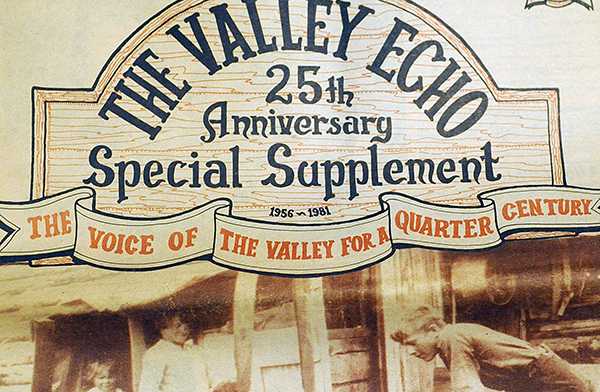Home »

Unlikely union may signal more changes
A significant announcement regarding the future of newspapers in the Columbia Valley went virtually unnoticed and without comment recently. Yet it is telling that our valley newspapers are not immune to the same challenges facing newspapers throughout North America. The announcement may also signal more changes to come in local journalism.
The Invermere Valley Echo and The Columbia Valley Pioneer announced they are ‘joining forces.’ Rose-Marie Regitnig, the publisher of the Pioneer has been named publisher of both newspapers. Separate ownership of the newspapers would remain unchanged, Black Press owning The Valley Echo and Misko Publishing owner of The Columbia Valley Pioneer. Both Black and Misko are newspaper companies that own numerous community weekly newspapers in British Columbia.
 I am an avid reader of both newspapers. I also share history with both newspapers. My first job was at The Lake Windermere Valley Echo. Starting at about age six I would wash the large letterpress equipment with varsol. I would have the job twice a year; once near my mother’s birthday and again near Christmas. My parents Ron and Isabelle Ede owned and operated the newspaper and I guess they figured I could use the money during those times. Later, I would work in all aspects of the newspaper, from photography and darkroom procedure to writing and running presses.
I am an avid reader of both newspapers. I also share history with both newspapers. My first job was at The Lake Windermere Valley Echo. Starting at about age six I would wash the large letterpress equipment with varsol. I would have the job twice a year; once near my mother’s birthday and again near Christmas. My parents Ron and Isabelle Ede owned and operated the newspaper and I guess they figured I could use the money during those times. Later, I would work in all aspects of the newspaper, from photography and darkroom procedure to writing and running presses.
In 2004, in an effort to bring independence back to newspapers in the Columbia Valley, my partner Lisa Ede and I started the The Upper Columbia Pioneer. Later we sold to another independent that renamed the newspaper, The Columbia Valley Pioneer. This company in turn sold to Misko in 2010.
****
It is unclear what this unlikely union between The Pioneer and The Echo means to the readership and advertisers of the newspapers. Mergers within other industries, like banks or telecommunication companies, almost always mean fewer jobs, reduced product quality and a poor overall experience for customers.
Over the past two years it has been disheartening to watch the treatment of The Valley Echo by its current ownership. They have watched idly while an award-winning newspaper slipped to a publication barely significant within the valley. Dwindling circulation and high staff turnover has left the newspaper gasping. It seems a distant past that The Echo was awarded numerous awards for journalism, including top community newspaper in Canada and BC/Yukon (in 2009).
The decline is partly due to The Pioneer becoming the dominant newspaper in the area. But that is not the only reason. Black Press seems unable to vary from its cookie cutter approach it brings to the production of its newspapers. Like fast food chains that line the strip leading into town their newspapers all look and operate the same in differing communities. This may work in communities with a single newspaper but fails to work in a community with a choice of news publications. To combat this, when possible, Black Press is known for buying and shutting down competing newspapers, as they did in Nelson, leaving consumers with the weaker product.
When The Pioneer was bought by Misko, The Echo was in a position to regain some ground lost over recent years, but curiously did nothing to compete with the new ownership. In fact, they continued to slip.
Newspaper executives, in an effort to extract profit for their bosses in head office, make it difficult for editors, reporters and production personnel to create quality product. It is a testament to these people’s dedication and skill that chain owned community newspapers survive to this day.
Now that chains own both local newspapers it might be worth looking at the papers through the glassy eyes of a newspaper executive.
Comparing The Pioneer and The Echo may not be so simple. The Echo on any given week has fewer pages and less advertising space than the Pioneer. The Pioneer has more advertising, better design and colour throughout its pages. The Pioneer also boasts triple the circulation of The Echo. However, The Pioneer comes with a larger staff and significantly higher production costs.
It should be noted the circulation of The Echo is paid while the circulation of The Pioneer is free. What does this mean? Well, in the coffee room where I work, someone brings in about 10 copies of the Pioneer, plops them on the table, and we sit around for fifteen minutes, reading separate copies. On the other hand, each Wednesday one copy of the Echo is purchased and we take our turn reading the newspaper throughout the week. There is no doubt that the Pioneer is the more widely read newspaper, but not by as much as they claim. It is clear, however, which newspaper is tougher on the trees and fossil fuels used to produce them.
So in the eyes of a newspaper executive which paper is better? It wouldn’t necessarily be the newspaper that consumers and advertisers like the best. It would be the one that produces the greatest return dollar for dollar.
Advertisers and readers are protected when newspapers are produced by competing companies, but what happens when the papers merge? I suppose only time will tell.
What is both interesting and sad about this announcement is the lack of response from the public. Back at the coffee room the general sentiment was, ‘who cares?’ Perhaps people will care if advertising rates went up or they had to pay a buck and a half for The Pioneer.
Maybe even then people won’t care as more and more people turn to the Internet for their source of news. After all that is where the industry is heading. Look where you are reading this.
Newspaper companies know they have to transition to the Internet and that will prove difficult for them if they intend to employ their same old business practices. Black Press’s recent decision to add a pay wall to The Echo website seems mind boggling considering how poor and clunky the site is in the first place. A better strategy would be to increase views through producing a quality website. Proof that old habits die-hard.
The Columbia Valley deserves two strong newspapers that compete for advertisers and readers. It is within this spirit that guarantees quality.
This recent ‘joining of forces’ between The Pioneer and The Echo leaves many questions unanswered. What is clear, however, is journalism and how local news is delivered is changing in the Columbia Valley.
Bob Ede can be reached at [email protected].








